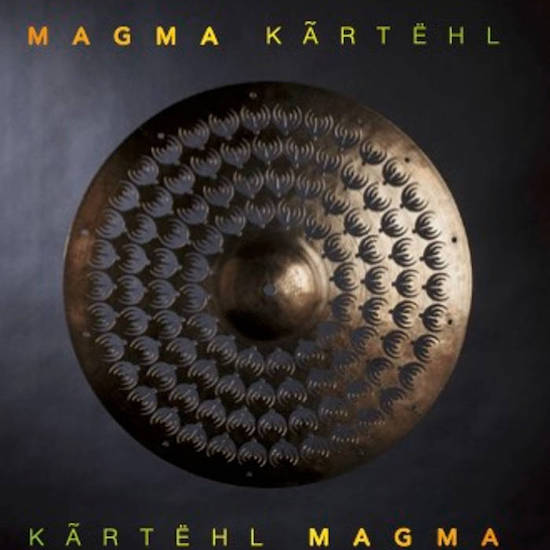The voices in Magma have always contributed to the group’s aesthetic, bringing calm, intensity or dread as the narrative demanded, but they have never been the centre of attention. On Kãrtëhl, however, they carry the rhythm, melody and emotion of nearly every track. This is partly because of where the balance of power now lies: over half of the latest incarnation – six of eleven – are vocalists. And it’s also because, in two respects, they’re taking a new approach – or rather, one they haven’t taken since Attahk in 1978. First, the album consists of six mid-length tracks, rather than their usual thirty-five to forty minute single works (as seen most recently on 2019’s apocalyptic masterpiece Zëss (The Day Of Nothingness)). Second, it is co-written by various members of the band, rather than band creator Christian Vander being the font of everything. Each track is distinct, expertly mining seams Magma have visited over the decades.
In this new context, Vander’s own vocals work wonderfully. He’s no longer incanting in martial tones but, on opener ‘Hakëhn Deïs’, sounds warm and vulnerable when singing, not trying to conceal his seventy-four years. Along with album closer ‘Dëhndë’, Vander demoed this track in 1978 and has kept it on the back burner since. It’s soulful, sure, justifying its nickname ‘Stevie Vander’ (the gag works best in a French accent, je vous le jure), but it sounds many magnitudes less strident than anything on Attahk. The same could be said of ‘Dëhndë’, though Vander’s English-language vocals and the fairly standard soul stylings in the music make it the weakest link on the album (despite some beautiful backing vocals).
‘Walömëhndëm Warreï’ is the album’s highlight, the most dramatic track here. Insistent, operatic non-verbal and Kobaïan vocals build alongside Jimmy Top’s astounding bass. It’s impossible to pull off in seven minutes what their thirty-five to forty minute works do: the narrative arc, the journey from despair to joy, from violence to bliss. Yet this comes close, a one day international to Theusz Hamtaahk’s test match. If it seems weird that a track so finely attuned to the essence of the band could be written by a new member – this was, by keyboardist Thierry Eliez – it’s worth remembering that Vander has always been in a position to hire and fire at will because so many accomplished musicians in France know their work back to front.
There’s also an exploration of the sort of sound that has endeared Magma in recent years to metal audiences, in the form of ‘Wïï Mëlëhn Tü’ by Simon Goubert. A slow beat and low-end piano create a sense of doom as effectively as anything from their 1973–76 period, before the vocal intensity builds towards a peak. In contrast, ‘Do Rïn Ïlïüss’, written by Hervé Aknin, is the most ecstatic piece. Vander’s drumming and high-pitched scat vocals here create an atmosphere that, on earlier albums, would have signified a joyous festival on an alien planet.
‘Irena Balladina’ is Vander’s other composition on the album, and it’s not your standard Magma. The song’s gentle bossanova washes over you, the waves varying a little in intensity and form, but there is no drama. Instead, it’s an exercise in beautiful repetition, its texture coming from overlapping vocal patterns. It feels like it could go on forever, not as part of an interstellar drama like the mammoth Zëss or any of the Theusz Hamtaahk trilogy, but as a spaced-out hymn to the ancestors.
Three years ago, Zëss showed that Magma can still produce work operatic in its scope and ambition; now Kãrtëhl reveals a collective that is very comfortable in its own skin. What Magma do in the next few years will determine whether Kãrtëhl comes to be seen as their well-executed swansong, or the start of a definitive new period.



